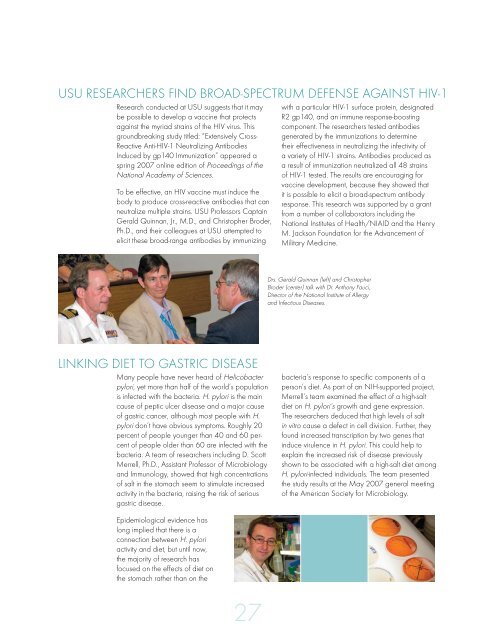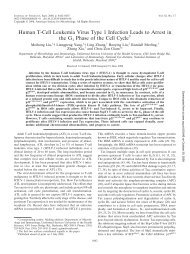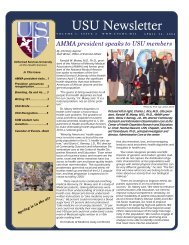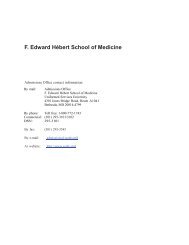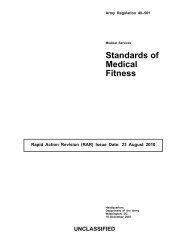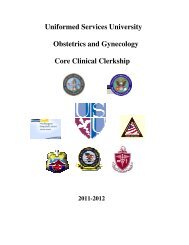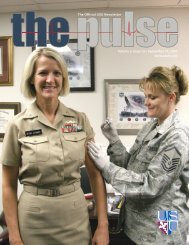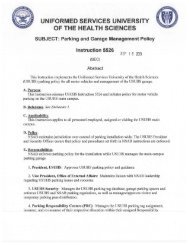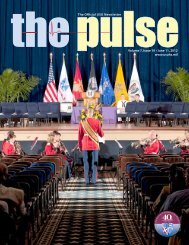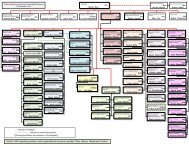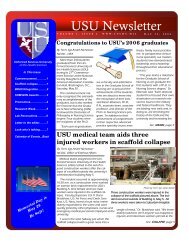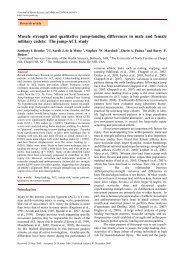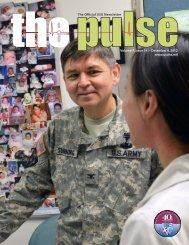Annual Report - Uniformed Services University of the Health Sciences
Annual Report - Uniformed Services University of the Health Sciences
Annual Report - Uniformed Services University of the Health Sciences
Create successful ePaper yourself
Turn your PDF publications into a flip-book with our unique Google optimized e-Paper software.
USU RESEARCHERS FIND BROAD-SPECTRUM DEFENSE AGAINST HIV-1Research conducted at USU suggests that it maybe possible to develop a vaccine that protectsagainst <strong>the</strong> myriad strains <strong>of</strong> <strong>the</strong> HIV virus. Thisgroundbreaking study titled: “Extensively Cross-Reactive Anti-HIV-1 Neutralizing AntibodiesInduced by gp140 Immunization” appeared aspring 2007 online edition <strong>of</strong> Proceedings <strong>of</strong> <strong>the</strong>National Academy <strong>of</strong> <strong>Sciences</strong>.To be effective, an HIV vaccine must induce <strong>the</strong>body to produce cross-reactive antibodies that canneutralize multiple strains. USU Pr<strong>of</strong>essors CaptainGerald Quinnan, Jr., M.D., and Christopher Broder,Ph.D., and <strong>the</strong>ir colleagues at USU attempted toelicit <strong>the</strong>se broad-range antibodies by immunizingwith a particular HIV-1 surface protein, designatedR2 gp140, and an immune response-boostingcomponent. The researchers tested antibodiesgenerated by <strong>the</strong> immunizations to determine<strong>the</strong>ir effectiveness in neutralizing <strong>the</strong> infectivity <strong>of</strong>a variety <strong>of</strong> HIV-1 strains. Antibodies produced asa result <strong>of</strong> immunization neutralized all 48 strains<strong>of</strong> HIV-1 tested. The results are encouraging forvaccine development, because <strong>the</strong>y showed thatit is possible to elicit a broad-spectrum antibodyresponse. This research was supported by a grantfrom a number <strong>of</strong> collaborators including <strong>the</strong>National Institutes <strong>of</strong> <strong>Health</strong>/NIAID and <strong>the</strong> HenryM. Jackson Foundation for <strong>the</strong> Advancement <strong>of</strong>Military Medicine.Drs. Gerald Quinnan (left) and ChristopherBroder (center) talk with Dr. Anthony Fauci,Director <strong>of</strong> <strong>the</strong> National Institute <strong>of</strong> Allergyand Infectious Diseases.LINKING DIET TO GASTRIC DISEASEMany people have never heard <strong>of</strong> Helicobacterpylori, yet more than half <strong>of</strong> <strong>the</strong> world’s populationis infected with <strong>the</strong> bacteria. H. pylori is <strong>the</strong> maincause <strong>of</strong> peptic ulcer disease and a major cause<strong>of</strong> gastric cancer, although most people with H.pylori don’t have obvious symptoms. Roughly 20percent <strong>of</strong> people younger than 40 and 60 percent<strong>of</strong> people older than 60 are infected with <strong>the</strong>bacteria. A team <strong>of</strong> researchers including D. ScottMerrell, Ph.D., Assistant Pr<strong>of</strong>essor <strong>of</strong> Microbiologyand Immunology, showed that high concentrations<strong>of</strong> salt in <strong>the</strong> stomach seem to stimulate increasedactivity in <strong>the</strong> bacteria, raising <strong>the</strong> risk <strong>of</strong> seriousgastric disease.bacteria’s response to specific components <strong>of</strong> aperson’s diet. As part <strong>of</strong> an NIH-supported project,Merrell’s team examined <strong>the</strong> effect <strong>of</strong> a high-saltdiet on H. pylori’s growth and gene expression.The researchers deduced that high levels <strong>of</strong> saltin vitro cause a defect in cell division. Fur<strong>the</strong>r, <strong>the</strong>yfound increased transcription by two genes thatinduce virulence in H. pylori. This could help toexplain <strong>the</strong> increased risk <strong>of</strong> disease previouslyshown to be associated with a high-salt diet amongH. pylori-infected individuals.The team presented<strong>the</strong> study results at <strong>the</strong> May 2007 general meeting<strong>of</strong> <strong>the</strong> American Society for Microbiology.Epidemiological evidence haslong implied that <strong>the</strong>re is aconnection between H. pyloriactivity and diet, but until now,<strong>the</strong> majority <strong>of</strong> research hasfocused on <strong>the</strong> effects <strong>of</strong> diet on<strong>the</strong> stomach ra<strong>the</strong>r than on <strong>the</strong>27


